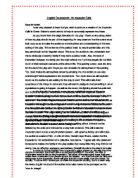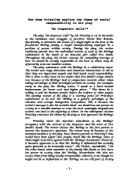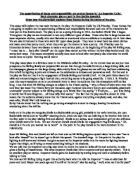How does priestly make 'an inspector calls' a dramatic play?
How does priestly make 'an inspector calls' a dramatic play? Priestly uses a variety of methods and techniques to make 'an inspector calls' a dramatic play. He includes dramatic irony, tension and suspense to create a dramatic atmosphere. The whole play is set in one room with no lapses of time. This in itself creates tension and also represents the Birling family's separation from the outside world. Priestly creates an uncomfortable atmosphere from the stage directions at the very beginning of the play. "The lighting should be pink and intimate until the inspector arrives. And then it should be brighter and harder." Priestly wants to show to the audience the difference in mood when the inspector arrives. It creates dramatic tension. Tension building is also used during act 1 when the Inspector will only show the photograph to Mr Birling. "Any particular reason why I shouldn't see this girl's photograph, Inspector?" This is dramatic because the characters and the audience are not sure whether to trust the inspector. They are questioning his reasoning. Dramatic irony is used to reveal Mr Birling's character in Act1. "Some people say that war is inevitable. To that I say fiddlesticks." Judging from when the play was written and when it was set, it is clear to the audience that Priestly is showing Mr Birling to be an ignorant man who is soon to be proven wrong in his
Compare and contrast the different generations in 'an Inspector calls'
Compare and contrast the different generation's response to the Inspector The different characters in 'an inspector calls' fall within different generation categories. The young being Eric ad Sheila, the old being Arthur and Sybil and Gerald who lies in between these two. They all have differing reactions to the inspector's presence and I believe the link is in their ages or generations. An Inspector Calls was written in 1946 but set in 1912. At a time when capitalism was ruling the country and people like Arthur Birling effectively rule the country. The setting of the play was very significant as it allowed the use of dramatic irony, especially when Birling speaks about the future. "We're in a time for a time of steadily increasing prosperity". As the audience knew what the future held for the people in the play they get an instant dislike for Birling as an arrogant, capitalist factory owner. The younger generation, Eric and Sheila respond to the inspector's presence very differently to their parents. Sheila responds to the inspector's interrogation very honestly and openly. "(Miserably) so I'm really responsible?" Instantly she accepts the blame and places it all on herself. This is a perfect example of how the younger generation reacts to the inspector. They don't lash out at him or try and shift the blame; they understand their part and accept the blame. Eric's
Explore the way the characters between different generations is developed in An Inspector Calls
Explore the way the characters between different generations is developed in An Inspector Calls In the play An Inspector Calls, written in 1946 by Mr J.B Priestley, there are two contrasting generations, the old and new. These characters are developed as the play unfolds. The play is set before World War 1, in 1912. This period was drastically different to the one in which it was written, 1946, with the social classes being much farther apart and the welfare state being non-existent. In this essay I will look at how the characters Sheila and Arthur Birling change over the course of the play, and how the generation gap affects this. These characters have been chosen because they, in my opinion, differ the most out of any two characters in the play. I will firstly look at how Sheila is portrayed when we first meet her at the start of the play. In the first act the Birling family is having dinner to celebrate Sheila marrying Gerald Croft, a lucrative decision for both of the families. Sheila is shown as sarcastic and playful when she says “(with mock aggressiveness) Go on Gerald- just you object!” This sentence implies that Sheila likes to joke around with Gerald, which was actually in contrast to how women were supposed to act in that period, showing early on that she is also quite rebellious. The word “mock” means, in this case, means fake and not serious, reflecting
An Inspector calls - A letter to Mr.smith from Mr J B Priestly.
English Coursework: An Inspector Calls Dear Mr Smith, I was very pleased to hear that you wish to produce a version of An Inspector Calls in Dover. Below is some advice to help to accurately represent my ideas. As you know from the stage directions in my play, I have a very strong vision of how my play should be set. At the beginning I'm very adamant that the scene must look cosy so as to make the audience more involved and understanding of the time setting of the play. The entrance of the parlour maid is very important also and this key part should not be forgotten about. This is so the audience can understand that this is obviously a wealthy family if they have a parlour maid. Also, the lack of interaction between the family and the maid reflects the fact that people did not think much of their domestic servants at this time in life. The opening scene sets the tone for the rest of the play and I hope you can recreate the atmosphere of the opening. You could make the atmosphere tenser by advising the characters to use very overwrought facial expressions and movements. You could also use atmospheric music as the audience are waiting for the play to start. This will make them suspicious of the things to come and they will start to prefigure that something bad or mysterious is going to happen. As well as the music, the lighting should be quite dull and focus in on specific
How does the character Sheila Birlings change in the play An Inspector Calls?
How does the character "Sheila Birling's" change in the play 'An Inspector Calls'? The play 'An Inspector Calls' was written in 1945 by J.B. Priestly, but it was set in 1912. At this time society was capitalist, there were very strong distinctions between upper and lower class people, industry and agriculture were privately owned and wealth was not shared equally. The play centers on the Birling family headed by Arthur Birling who is a wealthy factory owner. At the start of the play the Birling family is celebrating happily Sheila's engagement to Gerald Croft. However, the mood changes when Inspector Goole arrives and informs them about the suicide of a young woman named Eva Smith. Sheila Birling is the daughter of Mr. and Mrs. Birling is described at the start as "a pretty girl in her early twenties, very pleased with life and rather excited", most probably because of her engagement to Gerald Croft. Her hopes and plans for the future are to have a happy married life with her husband-to-be. Early in the play her mother informs her about married life claiming that men "spend nearly all their time and energy on business". However, Sheila does not agree and she warns Gerald, "so you be careful", which shows that she wants her fiancé to be attentive towards her. When we meet Sheila she seems to be satisfied with life; she is also from a comfortable family and so is Gerald.
How does Priestley explore the theme of social responsibility in his play An Inspector Calls?
How does Priestley explore the theme of social responsibility in his play "An Inspector Calls"? The play "An Inspector Calls" by J.B. Priestley is set in the midst of the turbulent class struggles of pre-First World War Britain. Specifically, it chronicles the events of a single night in the lives of the prosperous Birling family, a major manufacturing employer in a position of power within society. During the play, the writer ruthlessly unveils how the individual actions of each of the Birlings culminated in the death of an innocent girl called Eva Smith. Throughout the play, the writer conveys his compelling message of how we should be socially responsible as the lives of others may be affected by even our smallest actions. The play commences with the Birlings in a celebratory mood. The writer uses stage directions and character interactions to tell us that they are important people and hold much social responsibility. This is done so that later on we realise that Eva Smith's tragic demise was because of the Birlings' lack of compassion towards others when taking advantage of their privileged position in society. For example, early in the play Mr. Birling states: "I speak as a hard headed businessman...for lower costs and higher prices..." This shows he is willing to put his business profits before the welfare of other people. The opening section of the play is a starting
Describe the importance of Sheila's role in the play An inspector calls.
Describe the importance of Sheila's role in the play.-Michael Rowell At the beginning Sheila was not one of the main characters as Birling takes centre stage. Setting on the play seemed revolved around the characters. The older furniture in the living room matched the aging and upper class type that is Birling. During the play Sheila is the only concerned and totally serious character to the situation. There are some well linked scenes in the play setting a mood for Sheila with the marriage, her husband to be Gerald. The pink light in the house makes Shila feel more relaxed as the set looks almost like a love scene. During the play, Sheila is the main link between the Inspector and the Audience. She constantly changes and develops as the Story is told. From a happy normal women whose about to get married, changing stance with knowledge of the affair becoming disappointed and heart broken and then finding out that she had contributed to the Eva Smiths death making her emotions dramatic and to the audience she is the thoughtful character that everyone loves. There is great irony in Sheila's character as when the Inspector first comes round and as he is questioning Birling, she says how mean he is like "I think it was a mean thing to do" and "But these girls aren't cheap labour- there people" which is her having a go at Birling still going along with what the audience is
How Shakespeare portrays Romeo and Juliet in Act 2 Scene 2
How Shakespeare portrays Romeo and Juliet Act 2 Scene 2 is a particularly famous scene in William Shakespeare’s play, Romeo and Juliet. Often called the balcony scene, it is where the two lovers first meet to proclaim their love for each other. The balcony scene takes place after the ball in the Capulet Mansion, in Juliet’s orchard. The characters are presented in an unusual way, illustrating many recurring themes of identity, life and death, nature and love. The thoughts and feelings of Romeo and Juliet are conveyed through metaphors, enriching the reading or performance of the play. The actions and responses of others emphasize the division that is supposed to be between Romeo and Juliet and what makes it so moving is that we, the audience, knows what this division will bring about at the end of the play. The film by Baz Luhrmann of Romeo and Juliet enhances the visual experience and brings to life the metaphors used in a way that Shakespeare would have never been able to show visually. Shakespeare’s play contrasts with the societal views and expectations of young people and goes against the social norms expected in Elizabethan times. At the start of Act 2 Scene 2 Romeo, in a monologue, reveals his love and desire for Juliet as she appears at a window above him oblivious that Romeo is just beneath. The use of celestial imagery and mythological references are common
The apportioning of blame and responsibility are central themes in 'An Inspector Calls'. Each character plays a part in Eva Smiths downfall. Show how the playwright explores these themes during the course of the play.
The apportioning of blame and responsibility are central themes in 'An Inspector Calls'. Each character plays a part in Eva Smiths downfall. Show how the playwright explores these themes during the course of the play. This essay will explore the two main themes in the play 'An Inspector Calls' by J.B.Priestley. These themes that I am going to explore are the apportioning of blame and responsibility between each one of the characters for their part in Eva Smiths death. The play is set on a spring Evening in 1912, Just before World War 1 began. Throughout the play we are introduced to two very different types of class. Those who live in large houses and wear expensive clothes, usually who own factories or stocks and who are oblivious to anybody not in their class. We are also introduced to those who work for upper-class people. They have to wear hand-me-down clothes and make every last penny count, when they even get the chance to have a penny. J.B. Priestley uses the interaction between these two classes to make a very serious point, at the beginning of the play Mr Birling says, " a man has to ... look after himself" yet the upper class cannot survive without the low class workers and this works both ways. This means everybody actually does need to look after everybody else otherwise the world would have no cycle! Nothing would work! This play takes place in a
Examine the impact that inspector Goole had on the Birling household in
Examine the impact that inspector Goole had on the Birling household in 'An Inspector Calls' The inspector when he arrives in the Birling household, in J.B Priestley plays 'An Inspector calls', appears to be a reasonably normal police inspector in the first instance, but as it turns out is far from normal, but as he enters the other characters soon gather that the inspector gives off a demeanour of massiveness, solidity and purposefulness. He seems unaffected by his obvious disturbance of a party at such a late hour and nocks away Mr Birlings 'social niceties' going straight to the point, for example: Birling: Have a glass of port - or a little whisky. (Act 1) Inspector: No, thank you, Mr Birling. I'm on duty. (Act 1) He also shows little or no interest when Mr Birling tries to show him how important he is be explaining that he was once a magistrate and plays golf with the head of the Brumly police but he lets theses comments pass and goes doggedly to the point of his investigation. This point being the cause of suicide of a young girl, named Eva Smith. The fact that the inspector has no interest in Birlings social position unnerves Mr Birling because his normal defence has no effect. When the inspector starts to question the family he dose so in a manner which is very unlike any other or normal inspector would conduct himself. He begins by announcing the shocking



























